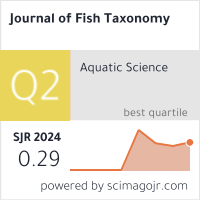Taxonomic Update on Coral Reef Butterflyfishes: Implications for Conservation
Keywords:
Taxonomic (TT), Coral Reef (CR), Butterflyfishes (BFF), Implications (II), Conservation (CC)Abstract
The Family Chaetodontidae, which includes coral-feeding butterflyfish, is used to monitor the ecological state of
Pacific coral reefs using its abundance, distribution, and behaviour as indicators. The best indicator species are
those that are members of the feeding guild of corallivores. They are noticeable and active throughout the day;
even inexperienced observers can readily gauge their behaviour. They are long-term, permanent inhabitants of
the living coral reef because they tend to be very site-attached, territorial, and predictable in their movement
patterns. They are closely related to the reef since they reside, spend the night, and eat living coral there. Reef
fishes are movable, but corals are not moving. Therefore, variations in the quantity, location, and behaviour of
the coral feeders signify adjustments to the reef's biological circumstances. The technique works well in situations
when reef disturbances happen gradually over time. A sensitive indicator approach is not required to identify
significant, sporadic alterations to the reef. The technique helps track alterations on a particular reef over time.
Comparing conditions on two or more reefs simultaneously is inappropriate because variations in the reefs'
butterfly populations may result from other processes like recruitment. It is a low-cost, simple-to-use technique
that shows promise for evaluating slow, gradual, but persistent long-term alterations to coral reefs. Research is
now being conducted to simulate this sort of shift. The method's application to Caribbean coral reefs is examined.








